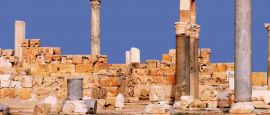Libya Shopping and nightlife
Shopping in Libya
The old souks and winding lanes of the capital, Tripoli, with its traditional mosques and khans (inns/warehouses), have particular streets given to spices, gold, silverware and animal skins. There are beautiful jewellery and perfume shops, filled with racks of blended oils and fragrances and old warehouses devoted to copper creations.
Keep an eye out for the bridal shops, selling everything the modern Libyan woman needs to tie the knot. There, you can even buy hen night hampers containing hairdryers, henna and underwear. Other local craft specialities include the famous embroidered Ghadames slippers, pottery from Gharian, trays and baskets made from palm leaves, and leather bags and belts. Be prepared to bargain a little, although not too hard.
Between the shops and market stalls are traditional hammams (each one has separate opening times for men and women) and places to grab a fruit smoothie, a bite to eat or a cup of sweet mint tea. It's worth noting that most Libyan women go to the souks in the morning; female travellers visiting alone might prefer to go then, rather than brace themselves for crowds of curious men. Souk shopping hours are generally Sat-Thurs 0800-1700, Fri 0800-1300.
Tripoli and Benghazi each have central shopping streets, where you can find clothing, groceries, books, magazines and souvenirs. Many shops are stocked with Italian imports; fine Italian shirts can be a good buy, as can shoes. Bookstores are largely limited to Arabic-language products, although you might get lucky and find a few books in English or Italian (try the children's and students' sections.) Nowhere does late night shopping better than the Arabic-speaking world, and Tripoli and Benghazi are no exception. Shops are usually open until 10 or 11pm most nights. Friday night shopping is a favourite family activity for many Libyans. Outside of the main cities, shopping is generally limited to the necessities.
Nightlife in Libya
Nightlife in Libya is almost nonexistent, even after the fall of the regime. Indeed, many young people from the northeastern part of the country head to Egypt for nightlife fixes. Under Gaddafi, nightclubs, bars and concert venues were banned. Underground venues occasionally pop up in Tripoli or Benghazi but are frowned upon, and you'll have to ask around to find them. Drinking alcohol remains illegal in Libya, although some travellers might be are able to find locally-brewed beer and wine.
After dark, coffee shops and shisha bars are generally the preserve of men; groups of women entering can expect to be met with raised eyebrows and requests for phone numbers. There are cinemas in major towns, some showing foreign films. Many towns and cities put on a festival with traditional dancing and music. The ancient city of Cyrene, near Benghazi, used to put on theatre productions in its Roman amphitheatre during tourist seasons - there are plans to reinstate these when tourism picks up again. In the summer, small theme parks become popular with Libyan families.




 You know where
You know where